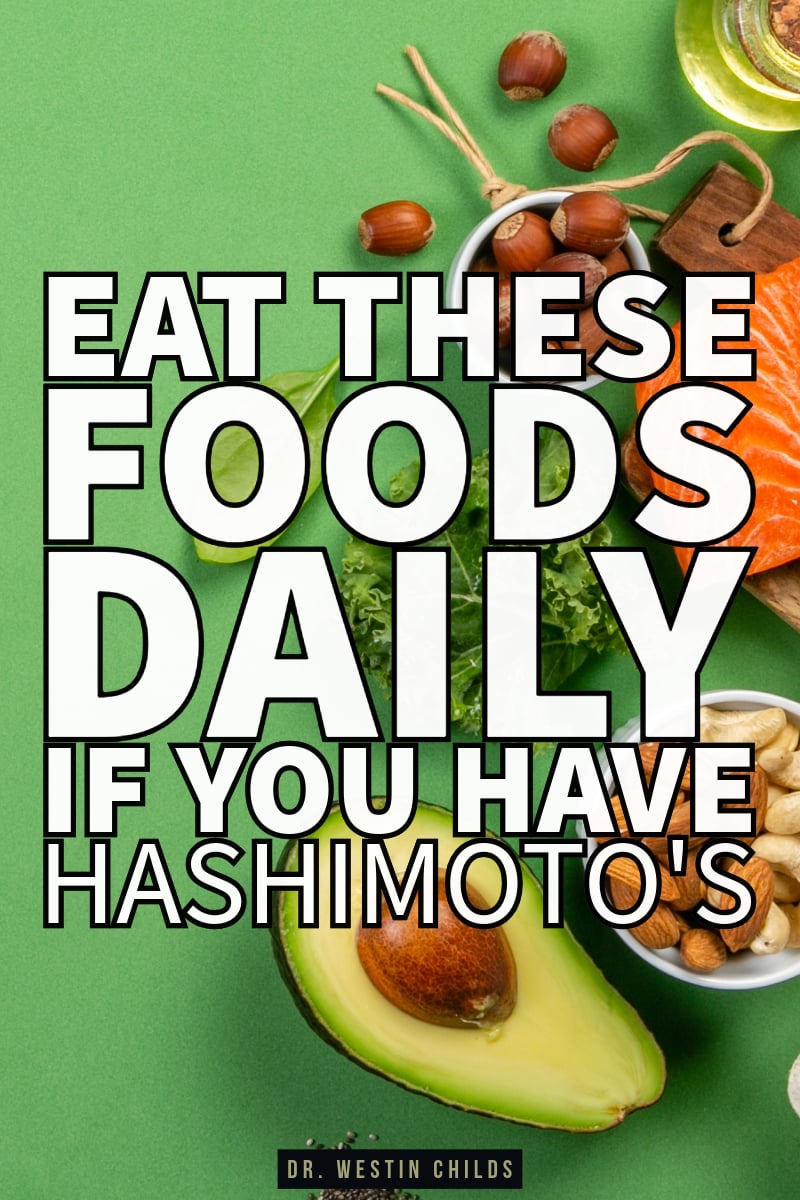Eating the right foods can reduce inflammation and support your thyroid.
Eating the wrong foods can send your immune system into overdrive and make your Hashimoto’s worse.
Your goal as someone who has this condition is to eat more of the foods that help you and less of the foods that don’t.
These Hashimoto’s superfoods will do just that.
But don’t let the name confuse you.
There’s nothing magical about these foods.
They just so happen to contain ingredients that help reduce inflammation and support your thyroid.
Eating more of them will help you feel better. It’s that simple.
DOWNLOAD FREE RESOURCES
Foods to Avoid if you Have Thyroid Problems:
I’ve found that these 10 foods cause the most problems for thyroid patients. Learn which foods you should avoid if you have thyroid disease of any type.
The Complete List of Thyroid Lab tests:
The list includes optimal ranges, normal ranges, and the complete list of tests you need to diagnose and manage thyroid disease correctly!
#1. Wild-Caught Salmon
You have an almost unlimited number of foods you can eat as someone with Hashimoto’s, but few are better than salmon.
Why?
Because it’s:
- Rich in omega-3 fatty acids which can help stop your own immune system from destroying your thyroid gland.
- It’s a great source of selenium which protects your thyroid gland from oxidative stress and the release of proteins that trigger a rise in thyroid antibodies.
- A 3.5-ounce serving contains 40 mcg of selenium.
- It’s an amazing source of protein that supports muscle health and, therefore, thyroid function (2).
- A 6-ounce serving contains 34 grams of protein.
- It contains a healthy dose of iodine which supports the creation of T4 and T3 thyroid hormones.
- A 3.5-ounce serving contains 15 mcg of iodine.
While all sources of salmon would be considered far healthier than the ultra-processed food that most people enjoy, do your best to stick to wild-caught salmon over farmed salmon.
Research shows (3) that wild-caught salmon has higher amounts of EPA and DHA, contains fewer contaminants and toxins, has a richer nutrient profile (more vitamins and minerals), and does NOT contain any artificial dyes or antibiotics (all of which are found in farmed varieties).
Eat this much:
As someone with Hashimoto’s, you’ll want to eat 2-3 servings of wild-caught salmon each week.
This amount allows you to reach your ideal omega-3 intake while limiting your exposure to heavy metals like mercury.
And by the way, if you don’t like salmon, you can swap them out for mackerel or sardines which provide similar benefits.
#2. 100% Non-Dutched or Undutched Cocoa (Not Alkalized)
Cocoa gets a bad reputation, mostly because it’s often associated with low-quality chocolate bars that are loaded with added sugar.
But if you cut out the sugar (or at least reduce it), and if you don’t heat or incorrectly process the cocoa, it’s actually a Hashimoto’s superfood.
Cocoa contains powerful bioactive compounds and antioxidants that make it incredibly healthy, including:
- Epicatechins and flavonols reduce oxidative stress and improve blood flow (4) and circulation (more blood flow means better thyroid hormone circulation and more nutrients that hit your thyroid gland)
- Theobromine is a mild stimulant that improves energy levels and heart health.
- Magnesium which supports thyroid hormone production and has a calming anti-anxiety effect
- And tryptophan which is an amino acid and precursor to melatonin which can impact your mood (great for fighting Hashimoto’s-related depression and brain fog)
This is well and good, but the reality is that you aren’t going to get these benefits from standard cocoa powders.
Why?
Because they are processed and alkalized.
This processing has damaging effects on many of the bioactive compounds (5) naturally found in cocoa powder.
But as long as you purchase a non-dutched, undutched, or non-alkalized cocoa powder, you’re good to go.
Eat this much:
Aim to incorporate 1-2 tablespoons of non-alkalized cocoa powder into your daily routine (throw it into a smoothie or warm beverage with something like almond milk).
For even better results, use a cocoa flavonol supplement like this one which has about 7x the flavonols of cocoa powder.
#3. Chia Seeds
These tiny seeds pack quite the nutritional punch, especially for someone with Hashimoto’s.
They truly are another superfood (6) for the following reasons:
- They are a plant-based source of omega-3 fatty acids (though this is not the same as the long-chain fatty acids found in fish).
- They are a high-quality source of fiber that supports gut health and regular bowel movements (patients with Hashimoto’s often suffer from constipation).
- It’s considered a complete source of protein with all 9 essential amino acids (though it is more calorie-dense compared to other protein sources).
- Consuming them naturally supports weight loss through their effects on satiety and appetite.
- It’s rich in zinc and magnesium which are essential to thyroid function.
Eat this much:
Add 1-2 tablespoons of chia to your diet each day.
The easiest way to do this is by incorporating them into a smoothie or by making a simple chia pudding.
#4. Oats
This is one that is going to cause some brains to melt, but let me explain why I put it here:
First, carbs are critical for thyroid function and you should aim to get around 100 grams of carbohydrates from your diet each day.
And second, oats actually provide some really interesting and beneficial compounds that help patients with Hashimoto’s through their impact on the gut.
The biggest is a soluble fiber called beta-glucan which acts as a prebiotic.
Why does this matter?

Because a huge portion of your immune system resides in your gut and we know, from a lot of research, that a healthy gut is one that reduces inflammation and promotes a healthy immune response.
That’s all fine, but I know what you’re thinking:
What about the sugar in oats?! Aren’t they going to spike my blood sugar and cause me to gain weight!?
And the answer to that is no.
Research shows that oats actually have a beneficial effect on blood sugar (7).
And, perhaps more important than that, they also should that people who eat oats regularly weigh less compared to those who don’t (8).
To make things even better, oats are naturally gluten-free and many patients with Hashimoto’s do better avoiding gluten.
Eat this much:
For best results, choose a gluten-free oat that is steel-cut or rolled (avoid instant varieties) and eat 1/3 to 1/2 a cup each day.
This daily serving will help improve your gut health within 2-3 weeks leading to better thyroid hormone recycling and, potentially, lower thyroid antibodies.
The easiest way to prepare oats is with a little bit of honey and some almond milk.
#5. Broccoli & Cauliflower
While all vegetables are healthy, some are healthier than others and two at the top of that list are broccoli and cauliflower.
These cruciferous vegetables contain sulforaphane which is a powerful antioxidant that supports detoxification and immune function (9).
In addition, you also get a natural source of indole-3-carbinol which helps balance estrogen (10).
Some patients with Hashimoto’s get tripped up with vegetables because they’ve heard that they are harmful to the thyroid.
While it is true that they contain goitrogenic compounds, you don’t need to worry about them.
Proper preparation (such as steaming or boiling) destroys these harmful compounds.
And beyond that, you can simply outcompete them with a healthy intake of iodine.
So don’t be afraid to load up on broccoli and cauliflower.
Eat this much:
Aim to get 1-2 servings DAILY if possible, but if you can’t hit that at least get them into your diet 3-4x each week.
To maximize their sulforaphane content and minimize their goitrogenic content, lightly steam them prior to consumption.
#6. Orange Juice
Fruit juices provide you with a super concentrated source of polyphenols which can help reduce inflammation, lose weight, and balance your immune system.
And of all fruit juices, orange juice is one of the best.
It contains loads of a powerful bioactive compound called naringin.
Drinking 1 cup of orange juice per day can:
- Help reduce inflammation in your body and thyroid gland.
- Balance immune function through its impact on the immune system.
- Support thyroid function by acting as a source of carbohydrates.
- And improve your gut health.
Again, I know you’re probably at least a little bit worried about weight gain because the conventional world would have you believe that fruit juice is worse than soda.
But the truth is the exact opposite (11).
Research shows that people who consume fruit juice weigh less than those who do not (12).
So you don’t need to worry about that.
What you need to be aware of, though, is that fruit juice is a concentrated source of calories, but there’s nothing inherently fattening about it.
If you drink it with a meal, then your body will adjust your caloric intake accordingly and you won’t experience weight gain (plus it has its own weight loss-promoting effects).
Drink this much:
1/2 to 1 cup per day is a great starting point for most patients with Hashimoto’s.
In a perfect world, you’d be able to get freshly squeezed orange juice.
But if you can’t get that, then your next best option is orange juice not-from-concentrate.
These benefits only apply to 100% natural orange juice without any added ingredients!
Do NOT purchase any orange juice that has added sugar, added ingredients, or that is from concentrate.
#7. Macadamia Nuts
Macadamia nuts contain a nearly perfect ratio of omega-3 to omega-6 fatty acids (13), making them one of the most Hashimoto’s-friendly nuts available.
They’re also rich in monounsaturated fats similar to those found in olive oil, which have been shown to reduce inflammation and support healthy cholesterol levels.
Their selenium content shouldn’t be ignored either.
While not as high as Brazil nuts, this still provides you a natural way to protect your thyroid gland and boost T4 to T3 conversion at the same time.
Eat this much:
Because they are calorically dense, stick to just about a handful per day.
That’s all you need to get their benefits.
#8. Shiitake Mushrooms
Shiitake mushrooms are probably the healthiest mushrooms out there.
Not only do they contain beta-glucans (similar but different to those found in oats), they also contain a large amount of spermidine.
And spermidine has been shown to have beneficial effects on:
- Hair growth & hair greying (14) (This is a natural way to fight Hashimoto’s-related hair loss)
- Inflammation
- Gut health (Support T3 recycling and T4 to T3 conversion)
- Immune function (15) (Help reduce thyroid antibodies)
- And metabolic health (Fight Hashimoto’s-related weight gain)
Eat this much:
I personally eat shiitake mushrooms daily, but since they can sometimes be expensive or difficult to get, aim to get them into your diet at least 2-3 times each week.
They can be sauteed, baked, or added to soups, but my favorite way to eat them is in a veggie hummus.
Final Thoughts
You can absolutely change the course of your disease and even put it into remission, as long as you take the right steps.
And the easiest, by far, is to simply change your diet.
But there are other things you can do that have been proven to help put Hashimoto’s into remission.
One of those is taking the right supplements.
And if you want to see a list of supplements that have been proven to lower TPO antibodies and thyroglobulin antibodies, check out this article next.
Scientific References
#1. https://pmc.ncbi.nlm.nih.gov/articles/PMC9998164/
#2. https://pmc.ncbi.nlm.nih.gov/articles/PMC4037849/
#3. https://pmc.ncbi.nlm.nih.gov/articles/PMC7766777/
#4. https://pmc.ncbi.nlm.nih.gov/articles/PMC6520706/
#5. https://pubmed.ncbi.nlm.nih.gov/18710243/
#6. https://pmc.ncbi.nlm.nih.gov/articles/PMC4926888/
#7. https://pmc.ncbi.nlm.nih.gov/articles/PMC9438016/
#8. https://pubmed.ncbi.nlm.nih.gov/36790719/
#9. https://pmc.ncbi.nlm.nih.gov/articles/PMC10886109/
#10. https://pubmed.ncbi.nlm.nih.gov/12840226/
#11. https://pubmed.ncbi.nlm.nih.gov/28526377/
#12. https://pmc.ncbi.nlm.nih.gov/articles/PMC4352186/
#13. https://pmc.ncbi.nlm.nih.gov/articles/PMC10173088/
#14. https://pmc.ncbi.nlm.nih.gov/articles/PMC3144892/
#15. https://pmc.ncbi.nlm.nih.gov/articles/PMC8927410/



